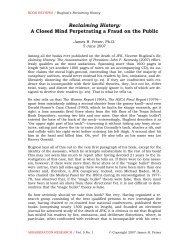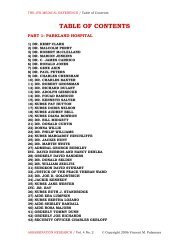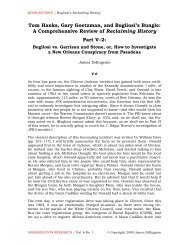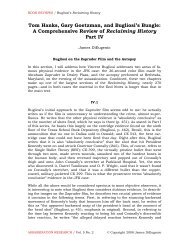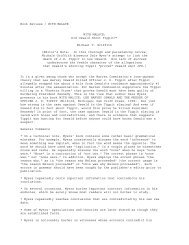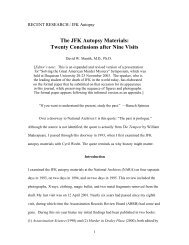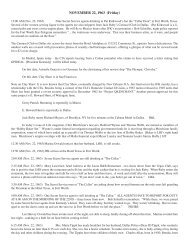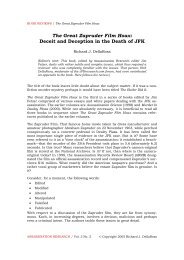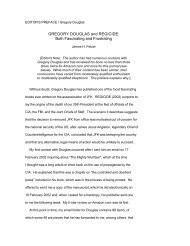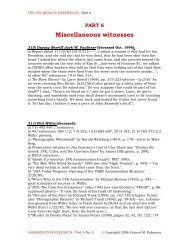A Comprehensive Review of Reclaiming History Part VIII
A Comprehensive Review of Reclaiming History Part VIII
A Comprehensive Review of Reclaiming History Part VIII
You also want an ePaper? Increase the reach of your titles
YUMPU automatically turns print PDFs into web optimized ePapers that Google loves.
James DiEugenio 30 Bugliosi’s Bungle, <strong>Part</strong> <strong>VIII</strong><br />
fact that his name had been exposed by an American journal<br />
called Counterspy. In fact, the leftist rebel group who killed him had issued a<br />
communiqué beforehand that revealed that they knew his name then (Schorr,<br />
p. 191). In a classic case <strong>of</strong> political propaganda, Ford and the CIA pulled out<br />
all the stops in using Welch’s funeral as psychological warfare against the<br />
committees. Welch’s body was flown into Andrews Air Force Base—but the<br />
plane circled the base for fifteen minutes, to time the landing for the morning<br />
news shows (ibid.). Ford attended the chapel service—but the press was barred,<br />
in order to suggest that they were to blame for Welch’s murder. Colby issued a<br />
statement saying that Welch’s death was the result <strong>of</strong> a “paranoiac attack on …<br />
Americans serving their country”. David Phillips was interviewed by CBS and<br />
said, “American agents are in less danger today from the KGB than from the<br />
‘moral primitives’ who ‘condemn my label’.” (ibid.) Welch’s body was buried at<br />
Arlington with full military honors; his c<strong>of</strong>fin was carried on the same horsedrawn<br />
caisson that carried President Kennedy’s. Colby gave the flag draped over<br />
it to Welch’s widow. As Schorr wrote, “This is the CIA’s first secret agent to become<br />
a public national hero.” (ibid.)<br />
It worked. Henry Kissinger jumped on the committees: “I think they have used<br />
classified information in a reckless way ….” (ibid., p. 194) Both committees<br />
closed up shop shortly after. Ford and the CIA held veto power over what could<br />
be published. When Otis Pike defied that agreement, Congress bottled up his<br />
report. A copy was smuggled to Daniel Schorr. As he was arranging to have it<br />
released, his boss, Bill Paley, lunched with Bush (ibid., p. 201). The Pike Report<br />
was published in a special issue <strong>of</strong> The Village Voice. Forgetting his own use <strong>of</strong><br />
classified material for his Oswald book, Ford now proposed an FBI investigation<br />
to find out who gave the report to Schorr (ibid., p. 208). After Paley’s meeting<br />
with Director Bush, Schorr was taken <strong>of</strong>f the air by CBS. After a two-hour impromptu<br />
interrogation—during which he was not represented by counsel—<br />
Schorr was fired by the network. He was later investigated by the House, but<br />
refused to reveal his source for the report.<br />
Ford’s performance with the Pike and Church Committees reveal his character<br />
in extremis. When it came to the intelligence community and their role in covert<br />
operations—including coups and assassinations—Ford joined whole-heartedly<br />
in the cover-up. This sheds retrospective light on his performance for the Warren<br />
Commission. But you would never know that from reading <strong>Reclaiming</strong> <strong>History</strong>,<br />
because you will find not one reference there to either Daniel Schorr or Richard<br />
Welch; therefore, you are not informed <strong>of</strong> how Ford engaged in warfare<br />
with the Pike and Church Committees. The Pike Committee is mentioned four<br />
times in the book, but only as a source: Bugliosi never chronicles what happened<br />
to it at the hands <strong>of</strong> Ford and the CIA. The influence <strong>of</strong> Colby’s leak<br />
about Angleton to Hersh, and Ford’s creation <strong>of</strong> the Rockefeller Commission, is<br />
dealt with in a footnote (p. 1236). In the references to Ford in the book, I could<br />
find no mention <strong>of</strong> the lunch with the New Yotk Times and his blurting out the<br />
word “assassination” as the reason why he picked who he did for the Rockefeller<br />
Commission.<br />
ASSASSINATION RESEARCH / Vol. 6 No. 1 © Copyright 2009 James DiEugenio



